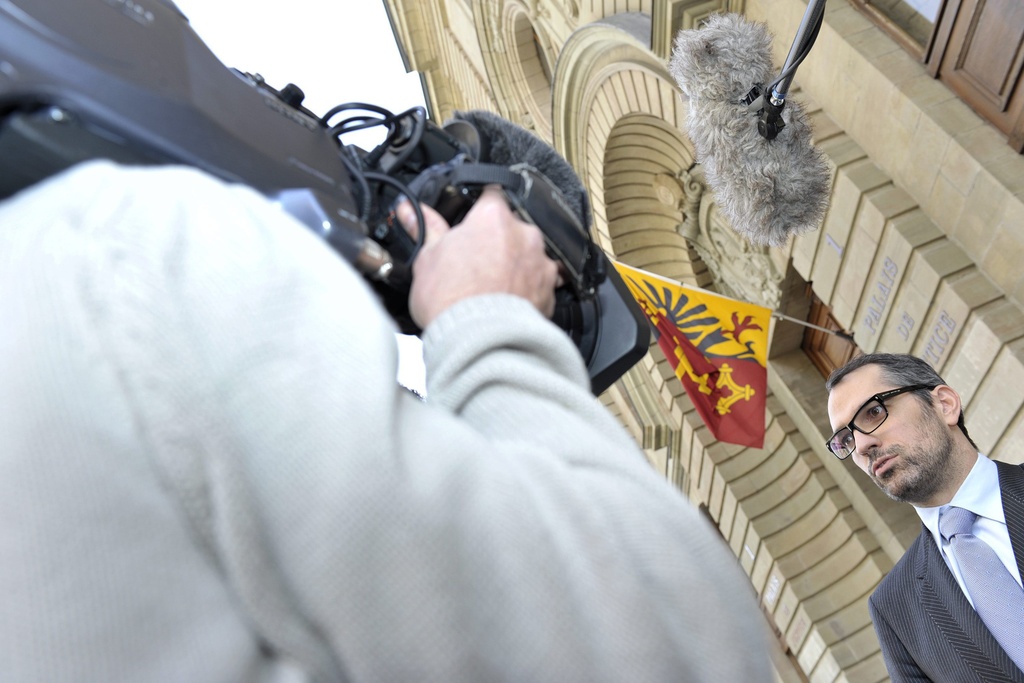Göldi returns to Switzerland

Swiss businessman Max Göldi has arrived in Switzerland after being detained for almost two years in Libya.
Göldi had been caught in the middle of a row between Switzerland and Libya since July 2008. A deal to normalise relations has now been signed – the second such accord since the dispute began.
Göldi returned in the early hours of Monday morning, arriving at Zurich airport. He was accompanied by Swiss Foreign Minister Micheline Calmy-Rey and was met by his family.
“Our joy is indescribable now that the long waiting, worrying and hoping has come to an end,” Göldi’s family said in a statement.
The Swiss foreign ministry said that Göldi had left Libya late Sunday evening.
“We are relieved and are really pleased for Max Göldi and his family,” Calmy-Rey said in a communiqué released late Sunday.
She also thanked Spain and Germany for their help.
Calmy-Rey was in Tripoli to sign the deal on Sunday with her Libyan counterpart Mousa Kousa. It was witnessed by Spain’s foreign minister, Miguel Angel Moratinos, and a German government representative.
After the deal had been announced, Libya revealed that its long-time ally Italy had played a “decisive” role in resolving the deadlock. “I want to thank Prime Minister [Silvio] Berlusconi for a key mediation role that was a great success,” said the Libyan prime minister.
Berlusconi left an official visit to Bulgaria early in order to be in Libya once the agreement was signed. He flew into Tripoli for a meeting between Calmy-Rey, Moratinos and the Libyan leader Moammar Gaddafi in the early evening.
Göldi had been refused the exit visa needed to leave the country for the past two years.
Shortly before departing he told the Ansa news agency that he was “happy to leave” the North African country and that he would “never again” be returning. The hardest part of his ordeal had been the four months in jail, he said.
Relaxed and smiling, he said the first thing he would do in Switzerland was “go home”. He also thanked his Swiss-Swedish employer, ABB, which had “always supported” him throughout. He expects to continue working for the company.
Relief
Speaking after signing the memorandum of understanding with Libya, Calmy-Rey told a press conference: “Göldi will return to Switzerland. It is a relief for him and for us. But also it is the beginning of the normalisation of relations between Libya and Switzerland.”
The accord outlines a three-step action plan for repairing relations. It first stipulates the creation of an international arbitration tribunal to look into the circumstances of the arrest in Geneva in 2008 of Hannibal Gaddafi, a son of the Libyan leader. The arrest triggered the diplomatic row between the two countries.
As part of past reconciliation efforts Switzerland and Libya have already attempted to set up such a tribunal. Although Switzerland appointed its representative almost immediately, the Libyan side did not meet the agreed deadline, and the tribunal has never met.
The accord also states that Switzerland “apologises for the illegal publication” of police mugshots of Hannibal by a Swiss newspaper last September, which constituted “a violation of the confidentiality enshired in Swiss law”. The deal adds that the Geneva cantonal government recognised its responsibility in the affair.
The deal undertakes to ensure that the people responsible will be taken to justice.
Hannibal filed a civil lawsuit against the Tribune de Genève newspaper after it published the photos and a court has since ruled it was illegal to publish them.
For its part, Libya agreed to speed up Göldi’s release.
A new deal
A previous Swiss-Libya deal on normalising relations was signed last August, but caused an outcry in Switzerland when it was accompanied by an apology by then-president Hans-Rudolf Merz for the arrest of Hannibal.
The arrest, for alleged abuse against his servants in a Geneva hotel, resulted in retaliatory measures by Libya including shutting down Swiss businesses and withdrawing money from Swiss banks.
Göldi and another Swiss businessman, Rachid Hamdani, were also arrested in Libya, days after Hannibal’s detention. Blocked from leaving the country, their plight became central to the row between the two countries.
A first deal signed by Merz was in fact suspended in November 2009 when the men were not released according to a deadline set out in the accord.
While Hamdani was released this February after being cleared of charges of visa violations and illegally conducting business in the country, Göldi was sent to jail for four months. Released from prison on Thursday, he still had to await an exit visa.
695-day ordeal
Calmy-Rey had travelled to Madrid on Saturday to meet Moratinos and the pair then travelled onto Tripoli together. The European Union and Spain in particular, as the current holder of the rotating EU presidency, have been acting as mediators in the diplomatic dispute.
Göldi’s release this week was the catalyst for signing the accord. His 695-day ordeal has included his being abducted and held in a secret location by Libyan officials and ended with the four-month jail term for visa violations and a fine for illegally conducting business in the country.
Libya claimed Göldi’s imprisonment was a purely legal matter, but in Switzerland he was commonly regarded as a pawn in the standoff between the two countries.
After being released from prison Göldi was holed up in a hotel in the capital awaiting developments. His lawyer Salah Zahaf had said he was “physically and mentally in good shape” after leaving prison.
Reprisals
The crisis began in July 2008 when Hannibal Gaddafi and his wife Aline were held for two days over allegations they had beat their staff while staying in a hotel in Geneva.
The couple were released on bail and the servants later withdrew the charges after receiving compensation.
As part of the retaliatory efforts by Libya, Moammar Gaddafi urged jihad against Switzerland.
The affair became a pan-European problem when Tripoli stopped issuing visas to most EU citizens in retaliation for a Swiss imposition of Europe-wide visa restrictions on top Libyans. The measures have since been withdrawn.
swissinfo.ch and agencies
July 15, 2008: Hannibal Gaddafi and his wife are arrested and charged with abusing their staff. They are released on bail and leave Switzerland. The servants are later compensated and charges withdrawn.
July: Swiss nationals Max Göldi and Rachid Hamdani are arrested. Swiss businesses are forced to shut their offices and the number of flights to Tripoli is cut.
January 2009: A diplomatic delegation travels to Tripoli.
May: Swiss foreign minister visits Libya.
June: Libya withdraws most assets from Swiss bank accounts.
August: The Swiss president apologises in Tripoli for the arrest.
September: Göldi and Hamdani cannot leave the country despite a promise they would be freed by September 1.They disappear after undergoing a medical check-up in Tripoli.
October: A 60-day limit for normalising relations passes.
November: Swiss ministers say they will pursue visa restrictions for Libyans. On November 30 Göldi and Hamdani sentenced to 16 months in prison and fined for visa violations.
January 2010: Their terms are overturned and cut.
February 14: A Libyan newspaper reports Switzerland has drawn up a blacklist of 188 top Libyans.
February 15: Libya stops issuing visas to citizens of nations in the Schengen zone.
February 17-18: Swiss, Libyan, Italian, Spanish and Maltese foreign ministers try to hammer out a solution.
February 22: Göldi ordered to report to prison. Libya says it will retalitate if Switzerland does not hand him over. Hamdani obtains an exit visa.
February 25: Gaddafi calls for jihad against Switzerland, saying it is an infidel country destroying mosques.
March 3: Libya declares a trade and economic embargo of Switzerland.
March 27: Libya lifts a visa ban on citizens of 25 European countries after EU president Spain says a Swiss-instigated visa blacklist against 188 Libyans in those countries is scrapped.
April 13: A Geneva court backs a claim by Hannibal Gaddafi that the publication of leaked police photos of him by a Swiss newspaper infringed his privacy. It also rejects Hannibal’s claim for 100,000 Swiss francs ($95,000) in damages.
June 10: Göldi is released from jail and moves to a Tripoli hotel.
June 12: Swiss and Spanish foreign ministers travel to Tripoli.

In compliance with the JTI standards
More: SWI swissinfo.ch certified by the Journalism Trust Initiative












You can find an overview of ongoing debates with our journalists here . Please join us!
If you want to start a conversation about a topic raised in this article or want to report factual errors, email us at english@swissinfo.ch.